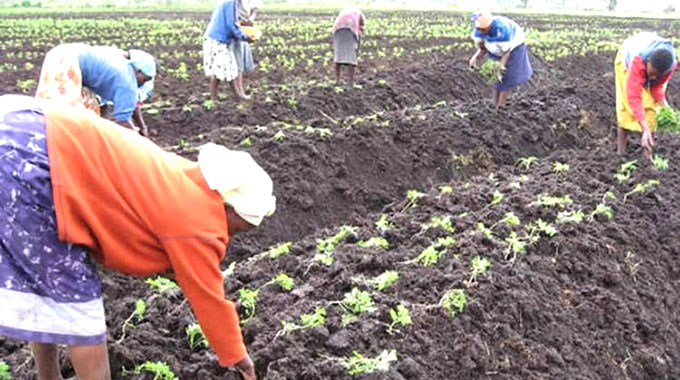COMMENT: Make hay while the sun shines

The just-ended rainy season was poor with large parts of the country, particularly the southern half of it, suffering prolonged dryness which scorched crops.
As a result of the drought, the Government on April 2, issued an international humanitarian appeal for US$2,2 billion. Of that sum US$955,67 million is earmarked for food insecurity response for 7,7 million people until April 2021.
Apart from the foregoing measure to address humanitarian needs until next year, the Government has put in place a programme to provide relief feed for livestock with particular focus on Matabeleland North and Matabeleland South provinces.
According to official figures, Matabeleland South lost about 26 000 head of cattle last year owing to lack of pasture and water, the worst affected districts being Beitbridge followed by Gwanda South, Matobo, Mangwe, Bulilima West and Insiza South.
In Matabeleland North 6 220 deaths were recorded. To avert more poverty deaths this year, the Government has started hay baling in both provinces.
As we report elsewhere today, the programme seeks to supply livestock farmers with feed at an affordable cost.
“Last year we lost over 26 000 cattle but the number can be around 30 000 because farmers don’t report everything,” said Matabeleland South Acting Provincial Agricultural Officer, Mr Mkhunjulelwa Ndlovu.
“If the situation is not addressed, we can record an increase this year and we could start recording deaths early. We thought 2020 would be a better year but it’s challenging as the grazing didn’t establish well in most areas in the province. As part of mitigatory strategies we have started hay cutting. We have identified Shangani area which is in Insiza North which is an area where there are a lot of grasslands and from there we will move to another area. We are already cutting hay and baling. A team is on the ground as we speak. Our aim is to bale as much as we can then distribute it to areas where it’s critical. It will be sold on a cost recovery basis as we want to urge farmers to be business minded. Our prayer is that people don’t burn down grass. Our target is to collect over 100 000 bales if we can get grass lands because we really need biomass for our livestock.”
The start of hay baling in Matabeleland South follows an announcement on May 3 by the Minister of Lands, Agriculture, Water and Rural Resettlement Minister Perrance Shiri that Treasury had released funds for the undertaking.
His commitment is now getting practical expression, which farmers in both provinces should find reassuring. Yes, the confirmation that we have is from Matabeleland South, but we have no doubt that the same is happening in Matabeleland North as well.
Cutting and baling of grass has started just as the fire season began on Wednesday last week. We know that cases of wildfires tend to increase a few weeks into the season thus what the Government has done starting the baling programme at this time should get as much grass as possible being harvested before the conflagration. When criminals begin to make the fires, there, hopefully, would be no much biomass to burn in both provinces.
However, the timely baling of hay will only make a positive impact if the intended beneficiaries actually benefit from the stock feed. We are raising this point because in many cases it is not the absence of hay that results in livestock dying of hunger, but the high cost involved in buying it.
Mr Ndlovu said the supply of hay will be on a cost recovery basis which means that farmers will not get it for free to feed their animals when the pasture shortage bites; they will have to buy it. That is good because it ensures that there are no freebies for farmers thus encouraging them to be business-minded. Our hope is that the prices for hay would be affordable.
While the Government is commended for providing resources for hay baling, farmers are urged to make their own hay wherever possible. If they have own stock on their properties, they will not need to spend much money and valuable time buying all their requirements from the Government when the time of crisis comes. Also, making their own hay gives them a measure of assurance that they can be able to feed their animals with no outside assistance if there is need for them to.
We find it critical for farmers to start watching the state of their pastures versus the size of their herds. Both sides of the equation must be in tune, we advise. If their herds are too large, farmers might need to reduce them now or invest in larger stocks of hay to pull them through the dry season.








Comments